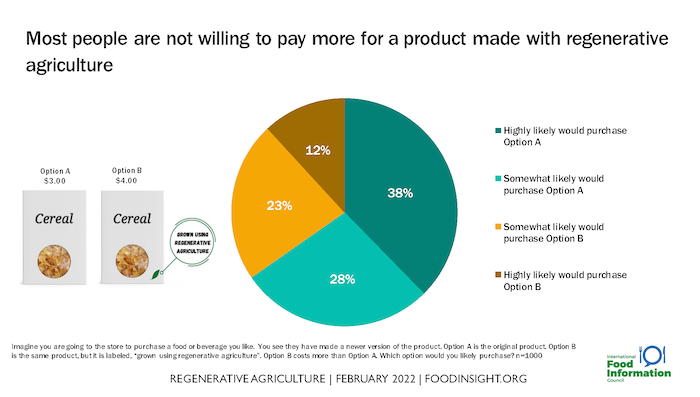While most consumers are familiar with organic farming, at least by name, far fewer consumers are familiar with other regenerative practices, including no-till, according to a recent survey.
The survey, published in late February by the International Food Information Council, conducted 1,000 interviews with adults from Dec. 2-6, 2021.
Among those surveyed, 59% said they had heard of organic farming, 55% said they had heard of crop rotation, and 52% said they were familiar with sustainable farming.
However, other practices and terms were much less familiar. Soil restoration was known to 37% of respondents, soil health to 33% of respondents, and cover crops to 25% of respondents. Slightly more people had heard of no-till farming, at 19%, than had not heard of any of any of nine terms used to describe various environmentally aware practices.
The survey also broke down respondents by various demographics. College-educated consumers were the most likely to report they had heard of no-till farming at 23%. About 24% of surveyed male consumers said they were aware of no-till farming, as opposed to just 14% of women.
About 40% of respondents said "choosing foods that are produced with environmentally sustainable farming" had the most beneficial impact on farmland. Respondents labeled crops grown without pesticides the second most beneficial impact at 34%.
That might discourage farmers who have toiled for years to identify and refine best practices related to tilling in the United States. However, the survey results contained some good news.
About 85% of respondents said they were interested in learning about the connection between food production and regenerative agriculture.
Regenerative agriculture refers to set of connected soil and crop management practices, typically including no-till or other alternative tillage methods, like strip-till, vertical till or minimum till.
The survey also put forward a hypothetical scenario in which consumers were offered two identical cereal products. One option cost $4, but contained a log indicating it was "Grown Using Regenerative Agriculture." The other cost $3, but had no banding.
About two thirds — 66% — said they were at least somewhat likely to purchase the cheaper unbranded product rather than the more expensive branded product.








Post a comment
Report Abusive Comment